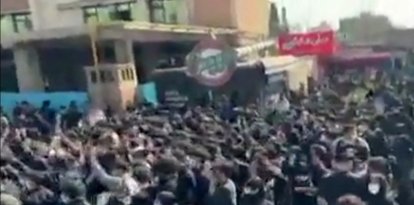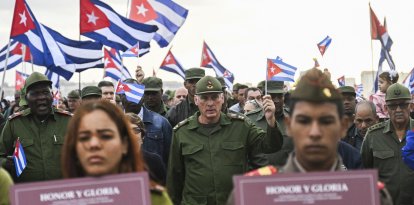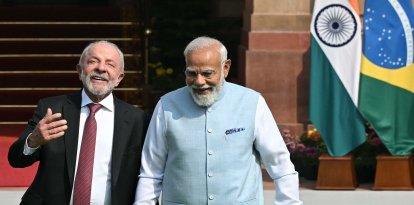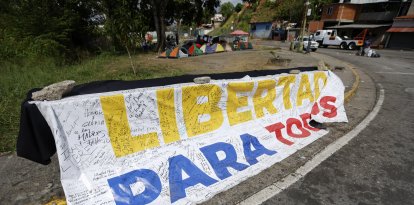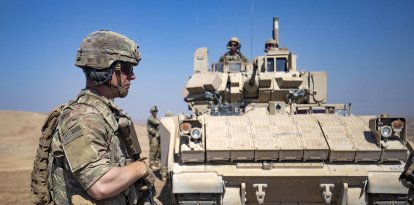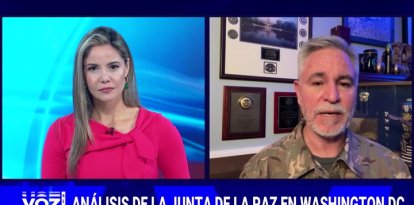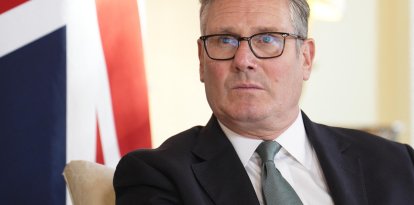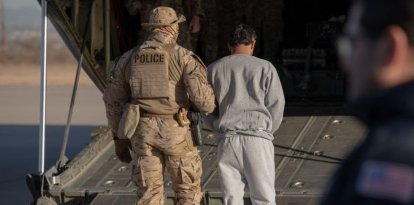ANALYSIS.
US-Iran 'indirect' talks begin in Oman on nuclear program
Steve Witkoff urges Iranian Foreign Minister Abbas Araqchi to halt the Ayatollah regime's uranium enrichment activities, warning that the use of force remains on the table if a resolution cannot be reached.

Iranian Foreign Minister Araghchi (left) with his Omani counterpart Badr Albusaidi.
Iranian Foreign Ministry spokesman Esmaeil Baqaei announced that "indirect talks" had commenced in Oman between Donald Trump's special envoy for the Middle East, Steve Witkoff and Iranian Foreign Minister Abbas Araqchi. However, the Ayatollah regime's messaging casts doubt on the meeting's effectiveness, as Trump had previously stated that the negotiations would be held "directly" between the two delegations.
This marks the first time both sides have engaged on the issue since 2018, when Trump withdrew the U.S. from agreements aimed at curbing the Ayatollah regime's nuclear program in exchange for easing economic sanctions.
"Our intention is to reacha fair and honorable agreement from a position of equality," said Araqchi in a video broadcast on Iranian state television. The meetings—unexpectedly announced by Trump last week—aim to secure a new deal with Iran, which has backtracked on its previous commitments and is nearing uranium enrichment levels sufficient for producing a nuclear weapon.
The "militarization of Iran's nuclear capability," a red line for Washington
Upon arriving in Muscat, Araqchi met with Oman's Foreign Minister, Badr bin Hamad Al Busaidi, to present "Iran's principles and positions regarding the talks, for him to convey to the other side," according to the Iranian Foreign Ministry.
For his part, Witkoff arrived at the meeting determined to pressure Iran to halt progress on its nuclear program, drawing a clear red line at the “militarization of Iran's nuclear capability,” as he emphasized in remarks from Russia. Following the announcement of the talks, Trump warned that military action against Iran remains “absolutely” possible if no agreement is reached.
"Our position begins with dismantling their program. That is our position today. That doesn't mean that, on the sidelines, we're not going to find other ways to try to reach a compromise," Witkoff said in statements to The Wall Street Journal.
In response, Iran threatened to expel inspectors from the International Atomic Energy Agency, who oversee its nuclear activities. Washington warned that such a move would be seen as a clear “escalation.”
Experts say Iran needs to negotiate
However, experts interviewed by AFP believe that Iran has a vested interest in returning to negotiations. The country remains weakened by sanctions that continue to strangle its economy, and its regional influence is under pressure following Israeli strikes on its allies in the region—Palestinian group Hamas and Lebanon-based Hezbollah.
Ali Vaez, an expert at the International Crisis Group think tank, believes that Iran "may commit to taking steps to limit its nuclear program" in exchange for a reduction in sanctions, "but not to dismantle it completely."
Will this lead to an end of Iran’s support for its terrorist proxies?
Karim Bitar, a professor at Paris Sciences Po University, predicts that any agreement "should include an end to Iran's support for its regional allies" such as Hezbollah or Hamas.
According to him, "the only priority (for Iran) is the survival of the regime and, ideally, get some oxygen, some sanctions relief, to relaunch the economy because the regime has become quite unpopular."
Iranian nuclear acceleration since 2018
The United States has adopted a "maximum pressure" strategy against the Islamic Republic, this week imposing new sanctions on both its nuclear program and oil sector.













